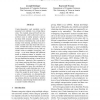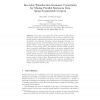390 search results - page 15 / 78 » A Model of Inductive Bias Learning |
UMUAI
2008
13 years 8 months ago
2008
Abstract. Self-efficacy is an individual's belief about her ability to perform well in a given situation. Because selfefficacious students are effective learners, endowing int...
AIED
2009
Springer
14 years 3 months ago
2009
Springer
Affect has been the subject of increasing attention in cognitive accounts of learning. Many intelligent tutoring systems now seek to adapt pedagogy to student affective and motivat...
EMNLP
2011
12 years 8 months ago
2011
Context-dependent word similarity can be measured over multiple cross-cutting dimensions. For example, lung and breath are similar thematically, while authoritative and superfici...
IJCNLP
2005
Springer
14 years 2 months ago
2005
Springer
Abstract. We present a new implication of Wu’s (1997) Inversion Transduction Grammar (ITG) Hypothesis, on the problem of retrieving truly parallel sentence translations from larg...
DAGSTUHL
2004
13 years 10 months ago
2004
Subgroup discovery aims at finding interesting subsets of a classified example set that deviates from the overall distribution. The search is guided by a so-called utility function...


